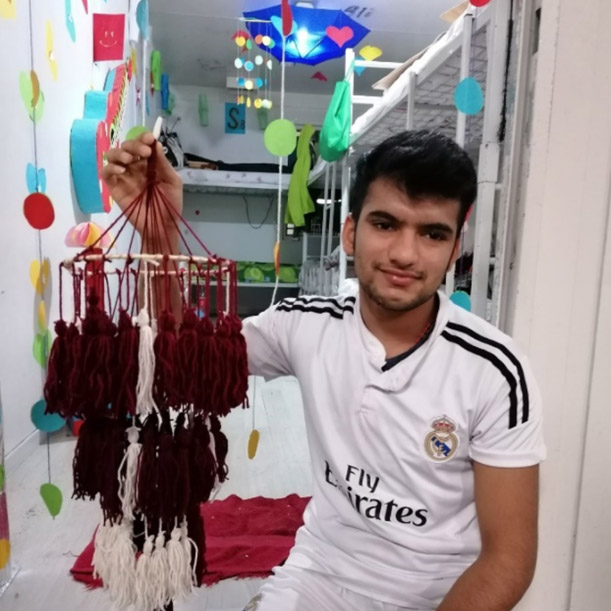Stories of Change

Kalash with one of his creations.
When Creativity Leads to Community
Note: This story was written in September 2020. On September 30, the Bosnian government closed the Bira reception center. Residents, including Kalash, were transferred to another center called Lipa (where CWS now works). Within a few days of his move to Lipa, Kalash left, presumably to continue his journey.
Growing up in Pakistan, Kalash and his family were close. It was a normal, quiet life. “I graduated from high school. While I lived in Pakistan, I loved to play cricket and often went jogging. My family is large, with seven sisters, two brothers and my parents. Our relationships are really strong, and we lived together in a big house.”
Unfortunately, Kalash’s family struggled economically. His brother left a decade ago, frustrated by financial struggle and an uncertain future. He now lives in France. Two years ago, Kalash decided to follow his brother’s footsteps in search of a better life and to provide for his family.
From Pakistan, Kalash spent six months in Turkey and then two months in Greece. He spent a few weeks in Serbia and then made his way to Bosnia, where he is today.
Along the way, Kalash met people from different backgrounds. Some were very friendly, he says. Other times he was met with racism and discrimination. “Respect is the ability to feel someone else’s pain and to treat strangers in a normal way,” he says. “Racism is when refugees and migrants are told that they smell bad or that they are ugly and dirty.”
Kalash arrived in Bosnia last summer, and for the better part of the year he has been in the city of Bihac. He has primarily lived in the Bira reception center, where CWS works. He has tried to cross the border into Croatia five times, and failed every time. He has been beaten by the police and had his phone and money confiscated. After repeated failures, and due to the lockdowns from the COVID-19 pandemic, he has temporarily stopped trying to cross the border.
When some of his friends left Bira to try to continue their journey, they offered Kalash the living space in their shipping container. He had been living in a tent with about 100 other people, so he eagerly jumped at the chance to have a container all to himself.
During the lockdown, Kalash entertained himself by watching videos on his phone. He found himself watching videos of people making crafts. He watched more and more videos, sometimes staying up all night. He was constantly thinking about how beautiful the products ended up being, and he thought he could make something similar.
Kalash mostly kept to himself in Bira and didn’t participate in many activities. But one day he noticed the CWS container, which has a creative corner that offers crafts and art for Bira’s residents. He liked the decorations, and wanted to do something similar in his container. So he talked to our team, who let him have some of the decorations for his container.
It turns out that this was the start of a new passion. He collects materials from the camp’s recycling to turn into art, and CWS provides the glue and other supplies that need to be purchased. He used an old umbrella and paper to make a chandelier, for example. Soon, his ordinary shipping container turned into an extraordinary place to live. When he got new roommates, they loved what he had done with the container. He even won an award from the Bira manager for having the most beautiful container.
Kalash says that the respect and recognition that he has received as a result of his creativity makes him very happy. He’s something of a celebrity within Bira now. And our team is excited to see him using his time to do something productive and different. Plus, the confidence that he built as his work started getting recognized helped him feel safer and start communicating more with the others in the center. “Thank you CWS for giving us a chance to develop and improve our abilities and skills that we don’t even know we possess,” Kalash says.
